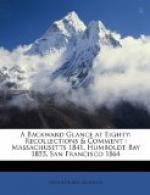Politics has had a wide range in San Francisco,—rotten at times, petty at others, with the saving grace of occasional idealism. The consolidation act and the People’s Party touched high-water mark in reform. With the lopping off of the San Mateo end of the peninsula in 1856, one board of supervisors was substituted for the three that had spent $2,646,000 the year before. With E.W. Burr at its head, under the new board expenditures were reduced to $353,000. The People’s Party had a long lease of power, but in 1876 McCoppin was elected mayor. Later came the reigns of little bosses, the specter of the big corporation boss behind them all, and then the triumph of decency under McNab, when good men served as supervisors. Then came the sinister triumph of Ruef and the days of graft, cut short by the amazing exposure, detection, and overthrow of entrenched wickedness, and the administration of Dr. Taylor, a high idealist, too good to last.
Early in 1904 twenty-five gentlemen (five of whom were members of the Chit-Chat Club) formed an association for the improvement and adornment of San Francisco. D.H. Burnham was invited to prepare a plan, and a bungalow was erected on a spur of Twin Peaks from which to study the problem. A year or more was given to the task, and in September, 1905, a comprehensive report was made and officially sanctioned, by vote and publication. To what extent it might have been followed but for the event of April, 1906, cannot be conjectured, but it is matter of deep regret that so little resulted from this very valuable study of a problem upon which the future of the city so vitally depends. It is not too late to follow its principal features, subject to such modifications as are necessary in the light of a good deal that we have accomplished since the report. San Francisco’s possibilities for beauty are very great.
The earthquake and fire of April, 1906, many San Franciscans would gladly forget; but as they faced the fact, so they need not shrink from the memory. It was a never to be effaced experience of man’s littleness and helplessness, leaving a changed consciousness and a new attitude. Being aroused from deep sleep to find the solid earth wrenched and shaken beneath you, structures displaced, chimneys shorn from their bases, water shut off, railway tracks distorted, and new shocks recurring, induces terror that no imagination can compass. After breakfasting on an egg cooked by the heat from an alcohol lamp, I went to rescue the little I could from my office, and saw the resistless approaching fire shortly consume it. Lack of provisions and scarcity of water drove me the next morning across the bay. Two days afterward, leaving my motherless children, I returned to bear a hand in relief and restoration. Every person going up Market Street stopped to throw a few bricks from the street to make possible a way for vehicles. For miles desolation reigned. In the unburned districts bread-lines marked the absolute leveling. Bankers and beggars were one. Very soon the mighty tide of relief set in, beginning with the near-by counties and extending to the ends of the earth.




